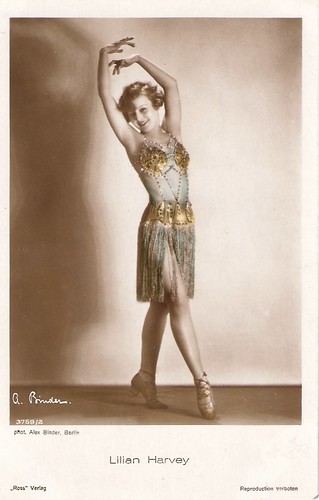
German postcard by Ross Verlag, no. 3759/2, 1928-1929. Photo: Alex Binder, Berlin. Ross Verlag.
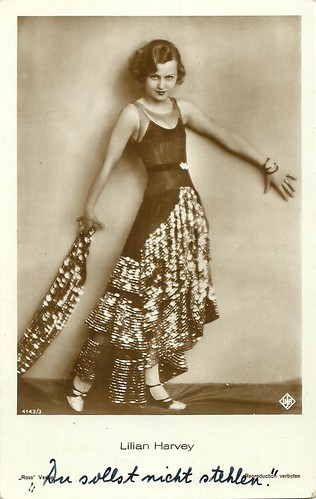
German postcard by Ross Verlag, no. 4143/3, 1929-1930. Photo: Ufa. Publicity still for Du sollst nicht stehlen/Thou Shalt Not Steal (Victor Janson, 1928).
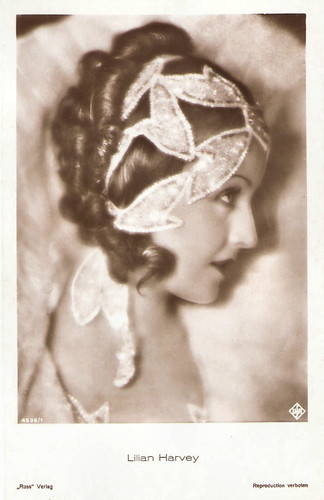
German postcard by Ross Verlag, no. 4538/1, 1929-1930. Photo: Ufa.

German postcard by Ross Verlag, no. 5311/2, 1930-1931. Photo: Ufa.
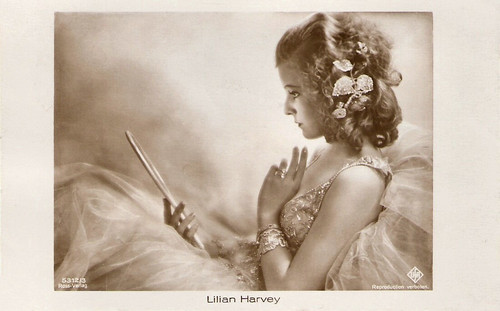
German postcard by Ross Verlag, no. 5312/3, 1930-1931. Photo: Ufa.
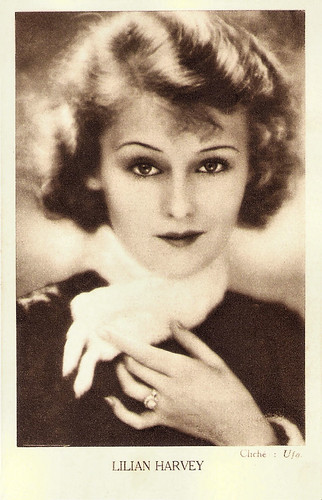
Dutch postcard by N.V. De Faam, Breda. Photo: Ufa.

German postcard by Ross Verlag, no. 6735/1, 1931-1932. Photo: Ufa.
Dream team
Lilian Harvey was born Helene Lilian Muriel Pape in Hornsey (North London), Great Britain, in 1906. Her mother was English, and her father was a German businessman. When Lilian was eight, they moved to Berlin.
At the beginning of World War I, the family found itself in Magdeburg, and they were unwilling and unable to return to England. She spent much of WW I with an aunt in Solothurn, Switzerland. After the war, she returned to Germany. She studied ballet at the Staatsoper Berlin in 1923 and worked in theatre revues. She assumed her grandmother's maiden name (Harvey) as her professional surname.
In 1924, Harvey received her first screen role as the young Jewish girl Ruth in the silent film Der Fluch/The Curse (Robert Land, 1925). Director-producer Richard Eichberg signed her on, and under his direction, she played her first leading roles in Leidenschaft/Passion (Richard Eichberg, 1925) with Otto Gebühr, and Liebe und Trompetenblasen/Love and Trumpet Blows (Richard Eichberg, 1925) opposite Harry Liedtke.
A year later, she acted for the first time with Willy Fritsch in Die Deutsche Susanne/The Innocent Susanne (Richard Eichberg, 1926), in anticipation of the future 'Dream Team of the European Cinema'.
Harvey appeared in the following years in such silent films as Die tolle Lola/Fabulous Lola (Richard Eichberg, 1927), Eine Nacht in London/A Night in London (Lupu Pick, 1928), and Adieu, Mascotte (Wilhelm Thiele, 1929) with Harry Halm.

German postcard by Ross Verlag, no. 941/2, 1925-1926. Photo: Alex Binder / Eichberg-Film GmbH.

German postcard by Ross Verlag, no. 1826/2, 1928-1929. Photo: Wa-Kie, Berlin.
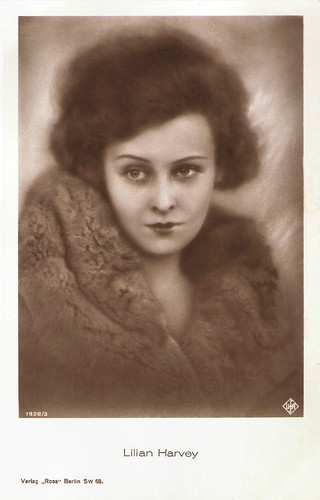
German postcard by Ross Verlag, no. 1928/3, 1927-1928. Photo: Ufa.

German postcard by Ross Verlag, no. 3035/2, 1928-1929. Photo: Eichberg-Film GmbH / Ufa.

German postcard by Ross Verlag, no. 3543/1, 1928-2929. Photo: Ufa.
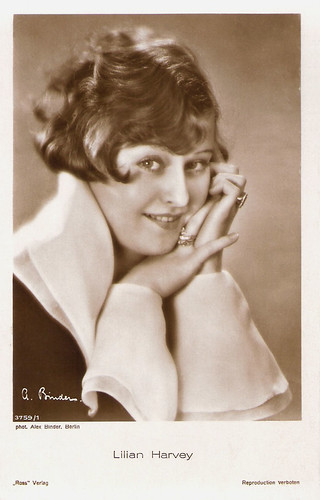
German postcard by Ross Verlag, no. 3759/1, 1928-1929. Photo: Alex Binder, Berlin.
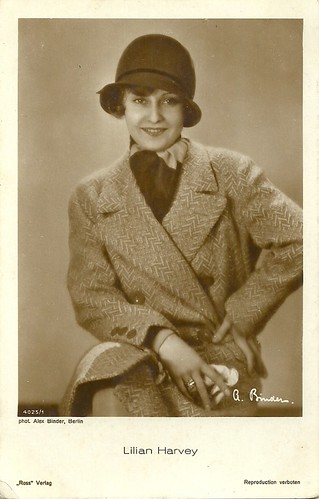
German postcard by Ross Verlag, no. 4025/1, 1929-1930. Photo: Alex Binder, Berlin.

German postcard by Ross Verlag, no. 4039/1, 1929-1930. Photo: Ufa.
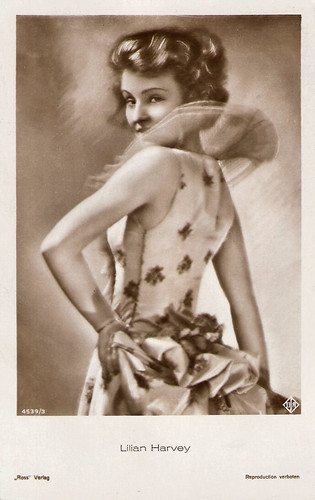
German postcard by Ross Verlag, no. 4539/3, 1929-1930. Photo: Ufa.
The sweetest girl
After many roles in silent films, Lilian Harvey was able to pursue a successful acting career during the initial sound film era of the early 1930s.
Because of her training as a singer and a dancer, Ufa found great use for her in light operettas.
In the hit Liebeswalzer/The Love Waltz (Wilhelm Thiele, 1930) she starred with 'sunny boy' Willy Fritsch, and they became the 'dream couple' of the German cinema.
Fritsch sang in the film the song 'Du bist das süßeste Mädel der Welt', and the press now dubbed Harvey the 'Sweetest Girl of the World'.
Together Harvey and Fritsch would make eleven box office hits, including Hokuspokus/Hocuspocus (Gustav Ucicky, 1930), Die Drei von der Tankstelle/Three Good Friends (Wilhelm Thiele, 1930), and Ein blonder Traum/A Blonde Dream (Paul Martin, 1932).
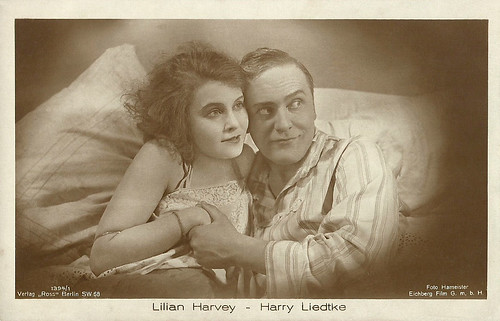
German postcard by Ross Verlag, no. 1394/1, 1927-1928. Photo: Hameister - Eichberg Film G.m.b.H. Publicity still for Liebe und Trompetenblasen/Love and Trumpet Blows (Richard Eichberg, 1925) with Harry Liedtke. Collection: Didier Hanson.

German postcard by Ross Verlag, no. 4593/1, 1929-1930. Photo: Ufa. Publicity still for Adieu Mascotte (Wilhelm Thiele, 1929) with Igo Sym.
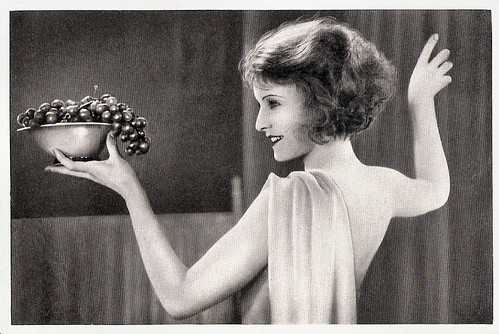
German collectors card in the series Sammelwert 'Der Stumme Film' by Ross Verlag, no. 10. Photo: Ufa. Publicity still for Adieu Mascotte (Wilhelm Thiele, 1929).

German postcard by Ross Verlag, no. 4805/2, 1929-30. Photo: Ufa.
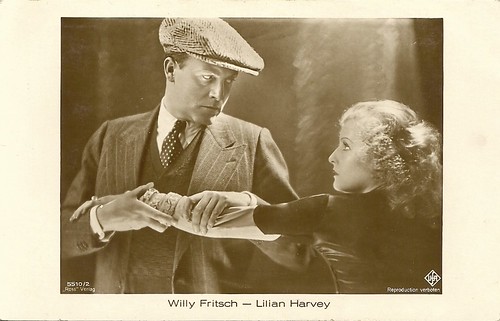
German postcard by Ross Verlag, no. 5510/2, 1930-1931. Photo: Ufa. Could be a publicity still for the early sound film Einbrecher/Burglar (Hanns Schwarz, 1930), in which Willy Fritsch is a burglar who gets an affair with a rich and neglected industrial's wife (Harvey).
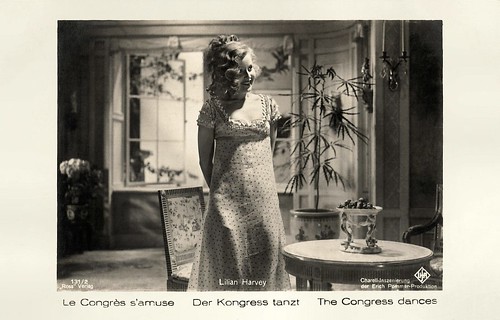
German postcard by Ross Verlag, no. 131/2. Photo: Ufa. Publicity still for Der Kongress tanzt/The Congress Dances (Erik Charell, 1931).
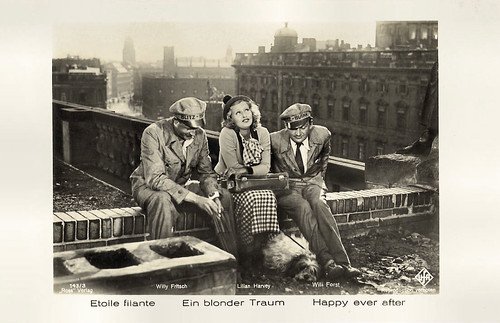
German postcard by Ross Verlag, no. 143/3, 1931-1932. Photo: Ufa. Willy Fritsch, Lilian Harvey and Willi Forst in Ein blonder Traum/Happy Ever After (Paul Martin, 1932).
Capricious and extravagant operetta
The postcards above show Lilian Harvey as Vienna glove sales lady Christl in Der Kongress Tanzt/The Congress Dances (1931), the first and only German film by director Erik Charell. Charell used the Vienna Congress as a background to the real story of Christl, who is causing an uproar because of her unconventional methods of advertising. She throws flower bouquets advertising her shop The Beautiful Shepherdess to all visiting dignitaries as they ride by in their coaches.
This immensely successful film operetta is not only a classic of the early German sound film, showing all the capabilities of the Ufa, but it was also a promising start of a film career that was not to be realized: Charell had to leave Nazi Germany and was unable to continue his career as a film director abroad. Der Kongress Tanzt is not a filmed operetta, but a real film operetta. The cast is great: next to Lilian Harvey and Willy Fritsch as Tsar Alexander of Russia, Conrad Veidt as the Machiavellian Prince Metternich, Lil Dagover as a glamorous countess, Paul Hörbiger and Otto Walburg are at their best.
Der Kongress tanzt has elegance, wit, beautiful sets, and brilliant music. Lilian Harvey's song 'Das gibt's nur einmal' became an evergreen. In this musical sequence, the heroine rides in a carriage to the castle she has been given by the Tsar. The scene is filmed in long takes where the camera just tracks and tracks and tracks, through the village, through the marketplace, through the fields and then goes on as she walks into the house. A 10-minute masterpiece in its own right.
More than just direct, Erik Charell choreographed the film. Although the film stands on its own feet, the influence of Ernst Lubitsch is evident. Der Kongress tanzt got also English and French versions as would be the case with her subsequent films. In those versions starred Lilian Harvey, but the crew and the rest of the cast were respectively British and French.
These foreign versions were so popular that Lilian Harvey became famous outside of Germany too. At IMDb, Jan Onderwater writes: "Der Kongress tanzt may not be perfect technically, but this is a sensual, made with great fun, original, capricious and extravagant operetta. Some scenes are even a bit bizarre and fetishistic. (...) It is curious that the film was not banned by Minister for Public Enlightenment and Propaganda Joseph Goebbels until October 1937."

German postcard by Ross Verlag, no. 6704/1, 1931-1932. Photo: Hollaender / Ufa.

German postcard by Ross Verlag, no. 6739/1, 1931-1932. Photo: Ufa. Lilian Harvey and Henry Garat in Le Chemin du Paradis/The Road to Paradise (Wilhelm Thiele, Max de Vaucorbeil, 1930).
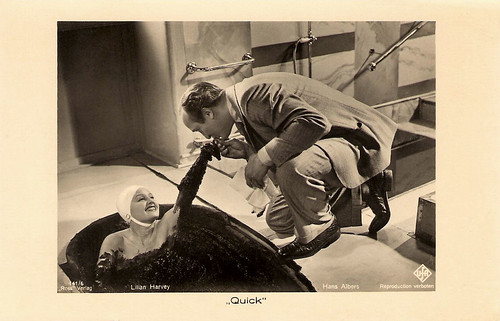
German postcard by Ross Verlag, no. 141/6. Photo: Ufa. Publicity still for Quick (Robert Siodmak, 1932) with Hans Albers. Collection: Geoffrey Donaldson Institute.

German postcard by Ross Verlag, no. 181/3. Photo: Ufa. Lilian Harvey and Heinz Rühmann in Ich und die Kaiserin (Friedrich Hollaender, 1933).
Willy Fritsch & Lilian Harvey in Die keusche Susanne (1926). Source: Sittichfan (YouTube).
Lilian Harvey sings 'Das gibt's nur einmal' (Just Once For All Time) in Der Kongress tanzt (1931). Source: Zaychatina (YouTube).
To be continued tomorrow.
Sources: Thomas Staedeli (Cyranos), Sandra Brennan (AllMovie), Jan Onderwater (IMDb), Wikipedia, and IMDb.
This post was last updated on 23 August 2024.
No comments:
Post a Comment